牛津版6A语法点概括
英语牛津版六年级知识点
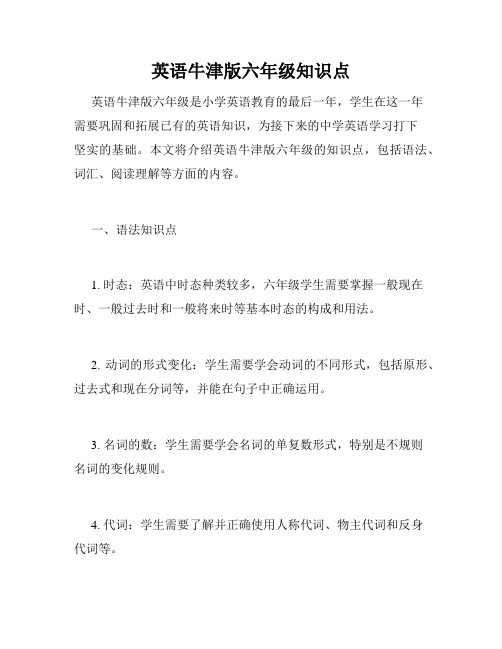
英语牛津版六年级知识点英语牛津版六年级是小学英语教育的最后一年,学生在这一年需要巩固和拓展已有的英语知识,为接下来的中学英语学习打下坚实的基础。
本文将介绍英语牛津版六年级的知识点,包括语法、词汇、阅读理解等方面的内容。
一、语法知识点1. 时态:英语中时态种类较多,六年级学生需要掌握一般现在时、一般过去时和一般将来时等基本时态的构成和用法。
2. 动词的形式变化:学生需要学会动词的不同形式,包括原形、过去式和现在分词等,并能在句子中正确运用。
3. 名词的数:学生需要学会名词的单复数形式,特别是不规则名词的变化规则。
4. 代词:学生需要了解并正确使用人称代词、物主代词和反身代词等。
5. 形容词和副词:学生需要学会形容词和副词的用法和比较级、最高级等的变化规则。
二、词汇知识点1. 常用词汇:六年级学生需要掌握一些基本的常用词汇,如家庭成员、动物、食物等,这些词汇在日常生活和学习中经常使用。
2. 句型词汇:学生需要扩展句子结构,学会使用连接词和短语来组成复杂的句子。
3. 扩展词汇:学生需要学习一些拓展词汇,如形容词的同义词和反义词,动词的近义词和一些常用短语搭配等。
三、阅读理解知识点1. 理解短文:学生需要学会阅读并理解一些简短的英文短文,获取信息并回答问题。
2. 猜测词义:学生需要通过上下文的提示来猜测生词的意思,提高阅读能力。
3. 根据短文内容回答问题:学生需要根据短文中的信息来回答问题,培养整体理解能力。
四、写作知识点1. 写作格式:学生需要学会写一篇简单的英语作文,包括开头、主体和结尾。
2. 写作内容:学生可以写一些简单的介绍自己、描述家人或朋友等日常生活的话题,培养写作能力。
3. 语言表达:学生需要运用所学的语法知识和词汇,正确地表达自己的思想和观点。
以上是英语牛津版六年级的一些知识点,通过学习这些知识点,学生可以更好地掌握英语,提升听、说、读、写的能力。
在完成六年级的学习后,学生将具备进一步学习中学英语的能力和信心。
牛津6A学习知识点情况总结

牛津英语6A 知识点总结一.名词☆可数名词:可数名词变复数的规则变化不规则变化☆不可数名词:a.b.c.d.e.g.注意:fish 鱼肉(不可数)fish 鱼(可数,单复同形)crab 蟹肉(不可数)crab 螃蟹(可数)☆量词:☆只能接_____________________:a few 几个few 几乎没有many 许多too many 太多☆只能接______________________:a little 一点little 几乎没有much 许多too much 太多too little 太少☆既可以____________________________________:some 许多any 许多plenty of = a lot of=lots of 大量的enough 足够的☆分类:1.___________________________: chicken steak sauages meat2.___________________________: fish crab prawns squid3.___________________________: ice-cream fish balls4.___________________________: milk eggs5.___________________________: chocolate crisps sweets6.___________________________: cakes biscuits bread small cakes7.___________________________: 7-up fruit juice coffee lemonade Coke8.___________________________: carrots onions tomotoes cabbages lettucespotatoes9.___________________________: peaches pineapples oranges pears bananas apples10.___________________________: rice noodles二.冠词☆不定冠词:带有a/an 的词组:a lot of 许多,大量a few 几个a little 一点have a rest 休息have a break 休息have a good time 过得愉快half an hour 半小时☆定冠词:the +形容词的最高级the tallestthe +序数词the second带有the 的词组:play +the +乐器演奏某种乐器in the morning/afternonn/evening 在早上/下午/晚上the same 相同的at the weekend 在周末all the rest 剩下的全部lay the table 摆好餐具on the left 在左边on the left of 在……右边on the right 在右边on the right of 在……左边go to the cinema 去看电影the USA 美国☆零冠词1.月份,星期,季节前2.三餐前3.play+球类4.by +交通工具5. 零冠词的词组:go to school 去上学at school 在学校at home 在家at noon 在中午at night 在下午on weekends 在周末best of all 所有当中最好的go skating 去溜冰go shopping 去购物三.数词☆基数词:表示数量☆序数词:表示顺序在第十层on the tenth floor☆百,千,百万百:hundreds of 数以百计的one hundred 一百two hundred 二百千:thousands of 数以千计的one thousand 一千two thousand 两千百万:millions of 数以百万的one million 一百万two million 两百万☆单位millimetre/er 毫米缩写:_______centimetre/er 厘米缩写:_______metre/er 米缩写:_______ kilogramme 千克缩写:_______ second 秒minute 分hour 小时四.代词☆人称代词:☆指示代词:五.形容词☆形容词的比较级和最高级变化:a). +er +estb). 以e结尾+r +stc). 重度闭音节结尾的,双写+er +estd). 辅音+y结尾的,y改成i+er i+este). 多音节词:more +多音节词most+多音节词特殊变化: good/well------______________------_________________much/many-----_______________-----________________bad------_____________________-----_________________☆句型结构:A 比B 更……A +be+比较级+than +BA最……A +be+the +最高级☆同义句转换:1.Danny is lighter than Peter.2.I am 150 cm. My brother is 180 cm.☆形容词的排序:限数描大形,新色国材名一张灰色的大圆桌_________________________________________________________六.副词☆频度副词:注意:位置:用于__________________时态☆方式副词:用来修饰动词或者动词词组在形容词后面加ly, 以辅+y 结尾,把y变i,再加ly1.loud---____________________2.quiet----_____________________3.slow---_____________________4.quick---_____________________5.happy---____________________七.介词☆表示时间的介词☆in+年,月,季节在一月份in Januaryon+具体的某一天(包括某一天的早上,下午或晚上)在周日on Sunday morning 在周日的晚上on Sunday evening at+时刻在一点十五at a quarter past five☆表示位置的介词1.live in (大地点) Ben and Kitty live in a housing estate.live on +楼层They live on the ninth floor.live at +具体的地点He lives at Flat 18B.2.arrive at(小地点)I'll arrive at Wanda Cinema at nine o'clock.arrive in(大地点)My father will arrive in Beijing tomorrow.3.on+岛屿on Hongkong Island4.in front of in the front of5.next to beside near6.There is a bird_______ the tree.There is an apple________ the tree.☆常用的介词短语1.what about=how about ……怎么样2.Write about 写关于……3.talk about 谈论4. tell sb. about sth. 告诉某人关于某事B. After系列1.look after 照顾2.After school 放学后3.run after 追赶C. For 系列1.be good for 对……有益2.be bad for 对……有害3.look for 寻找4.wait for 等待……5.cook food for people 给人们做饭6shop for food 去买食物7.get ready for…为…做准备8.It's time for +名词到……时间了D. From 系列come from=be from 来自于……E. Like 系列1look like 看起来像……2just like 就像……3.What's the weather like today? 今天天气怎么样?1play with sb. 和某人一起玩play with sth. 玩某物2.share sth with sb. 和某人分享某物3.be crowded with 挤满了…4make…with 用…来做G. Up 系列1.make up 化妆2.dress up 打扮3.grow up 生长H. To 系列1.sell things to people 卖东西给人们2. bring food to people 把东西带给人们3.bring sth to sb.4give sth to sb.5.show sth to sb6.want to do sth.7.need to do sth.8.one’s jurney to 某人去…的旅行9.a visit to…一次去、、、的旅行10fly to…= go to…by aeroplane 乘坐飞机去….I. of 系列1start of visit 参观开始2 end of visit 参观结束3.different kinds of food 不同种类的食物4.a list of foof 食品消费清单5. east of ……的东部6.the first day of Chinese New YearJ. On 系列1.go on a river trip 水上之旅2.go on a picnic 去野餐3.put on 穿上4.get on 上车5.stick…on…把、、、粘到、、、上6.on the pavement 在人行横道上7.on the zebra crossing 在斑马线上8on weekends 在周末9on one's way to 在某人去……的路上10on foot 步行11on the right 在右边☆介词短语后置介词短语后置,起到形容词的作用,来修饰前面的名词The children on page3 of this book are healthy.在书上第三页的孩子们很健康。
牛津英语6a知识点梳理
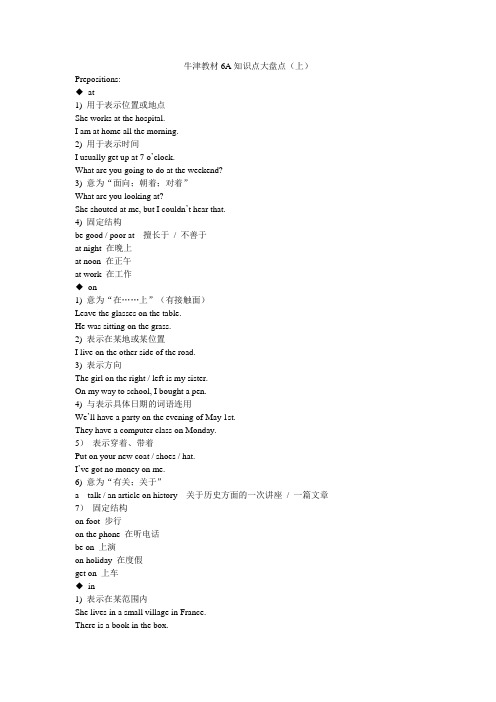
牛津教材6A知识点大盘点(上)Prepositions:◆at1) 用于表示位置或地点She works at the hospital.I am at home all the morning.2) 用于表示时间I usually get up at 7 o’clock.What are you going to do at the weekend?3) 意为“面向;朝着;对着”What are you looking at?She shouted at me, but I couldn’t hear that.4) 固定结构be good / poor at 擅长于/ 不善于at night 在晚上at noon 在正午at work 在工作◆on1) 意为“在……上”(有接触面)Leave the glasses on the table.He was sitting on the grass.2) 表示在某地或某位置I live on the other side of the road.3) 表示方向The girl on the right / left is my sister.On my way to school, I bought a pen.4) 与表示具体日期的词语连用We’ll have a party on the evening of May 1st.They have a computer class on Monday.5)表示穿着、带着Put on your new coat / shoes / hat.I’ve got no money on me.6) 意为“有关;关于”a talk / an article on history 关于历史方面的一次讲座/ 一篇文章7)固定结构on foot 步行on the phone 在听电话be on 上演on holiday 在度假get on 上车◆in1) 表示在某范围内She lives in a small village in France.There is a book in the box.2) 表示在某段时间内It happened in the past.My birthday is in August.3) 表示在某段时间后She will visit there in three weeks.I’ll come back in ten minutes.4) 固定结构be in = be at home 在家in spring / summer / autumn / winter 在春天/ 夏天/ 秋天/ 冬天in time 及时in hospital (生病)住院◆above 在……上方(没有接触面)The people in the flat above mine made a lot of noise.◆below 在……下方(没有接触面)Please do not write below this line.The temperature fell below freezing during the night.Adverbs:◆副词的分类1) 频度副词: always, often, usually, sometimes, seldom, hardly, never2) 地点副词: here, there, everywhere, anywhere, inside, outside3) 程度副词: much, little, very, rather, so, too, still, quite, enough, almost, slightly4) 疑问副词: how, when, where, why5) 表示先后顺序的副词:first / next / then / after that / finally; firstly / secondly / next / then / after that / finally◆副词的位置1) 多数副词都可以放在动词的后面;但如果动词带有宾语,副词就需放在宾语后面。
上海牛津六年级上6A各单元知识梳理

预初期末复习Module 1 Unit 1 family and relatives 单元重点1.关键词汇Relative :grandfather, grandmother, grandson, granddaughter, uncle, aunt, cousinFamily tree, family members :father, mother, son, daughter, brother, sisterplay games/football/badminton ;go shopping/swimming/cycling ;go to a restaurant/the park ;watch TV/a film ,only ,else ,classmate2.语言功能Asking for information 询问信息1)A :How many + 名词复数+ do you have ?B :I only have one……/ I have (number)……2)A :What (else)do you do with your + 名词?B :I always / usually / sometimes / never do sth. with my + 名词Introduction 介绍:This is ……/ These are ……Express good wishes 表示祝愿:Happy birthday !3. 语法要点1)频度副词always ,usually ,often ,sometimes 和never 在一般现在时中的用法:放在be 动词、助动词后面,放在行为动词前面。
She is often late for school .When do you usually do in the morning ?He usually goes to bed in the morning .1. 主格做主语,放在句首:I often go to the supermarket . (me)2. 宾格做宾语,放在动词、介词的后面:I sometimes go shopping with him (he)3. 形容词性物主代词做定语,放在名词前面:后面必须加名词Our classroom is very big and clean. (we)4. 名词性物主代词做主语、宾语、表语:后面不能加名词Is this her T shirt ?No ,hers is red . (she)That new flat is ours . (we)3) 一般现在时:主语除了是三单主语是第三人称单数I go to school on foot . She goes to school on foot .I don’t go to school on foot . She doesn’t go to school on foot .Do you go to school on foot ?Does she go to school on foot ?Yes ,I do . / No ,I don’t Yes she does . / No ,she doesn’t动词变化①以s ,x ,ch ,sh ,o结尾+es ;②以辅音字母+y结尾,去y+ies ;③have…hasModule 1 Unit 2 I have a good friend 单元重点1.关键词汇词性转换:friend n. ……friendly a. ……friendship n.help n. v. ……helpful a. ……helpless a.kind a. ……kindness n. ……kindly ad.pollute v. ……pollution n.discuss v. ……discussion n.use v. ……reuse v. ……useful a. ……useless a.angry a. ……angrily ad. ……anger n.visit n. v. ……visitor n.词组:talk to/with sb talk about sth = discuss sthlike to do/doing enjoy doingevery day every night/morning/afternoongo out at night walk to school = go to school on footbe together play togethereat one’s lunch share one’s foodhelp each other each other = one anotherhelp other people other people = othersbe late for ask sb about sthwork hard be kind toget angry get coldshare sth with sb tell lieslive in the USA visit Garden Cityfor the first time on Saturdaya friend of the Earth pick up rubbishlook after = take care of = care for all the things around uspollute the environment air/land/water/noise pollutionkeep ……clean keep + adj; keep quiteput rubbish into rubbish bins leave rubbishtell sb to do ; tell sb not to do ask , invite , allow , want sb not to dowant to be want/agree/decide/hope/offer/try/manage + to do promise to do ; promise not to do discuss sth with sb2.语言功能1)A :Thank you! B :Not at all./ You’re welcome./ It’s a pleasure./ That’s all right.2) A :We want to look after the environment . B :All right .3.语法要点1)We like to + v ……together2)be + adj :She is always naughty/clever/friendly/helpfui比较:She always gets angry . She never tells lies.3) A:Where have you been ? B:I have been to ……A:Have you been to ___________yet?B: yes, I have just /already been to ______./Y es , I have just /already been there.No, I haven’t been to ______yet. / no, I haven’t been there yet.4) we promise to .../we promise not to ..Module 1 unit3 spending a day out together1. 关键词汇词性转换happy a.------- happily ad. -------unhappy a.sand n. ---------sandy a.sun n. -------sunny a.cloud n.-------- cloudy a. wind n. ------windy a.rain n. ------rainy a. snow n. ------snowy a.luck n. ------lucky a. ------luckily ad. ------ unlucky a.act v. ------activity n. ------ actor n. ------ actress n. ------action n.collect v. ------ collection n.important a. ------importance n.special a. ------specially ad.词组:At weekends= at the weekend on weekdaysBe far away from be nearIn sandy bay/ sunny town on lucky islandCome with sb space museumA photo of me the students of class threeBuy tickets eat ice creamHave a barbecue/a picnic/lunch/dinner spend a holidayFly tickets ride bicycles= cycleMake sandcastle collect shellsMake an album come backPlan a visit plan to do sthCome back make some notesGet there get to ShanghaiMy sixtieth birthday her ninth birthdayHave a big birthday party have a good time = enjoy oneselfPlay with sb get enough food for the party2. 语言功能1)A: Let’s go to Ocean Park . B : That’s a good idea./All right.2)A: Where have you been in -----? B: I have been to ----in---with sb3) A: Which place shall we visit? B: Shanghai MuseumWhen shall we go there ? On SaturdayWhat time ---? 9 o’clockHow are we going to get there ? By undergroundHow much does it cost? = How much is it ?How much do they cost ? = How much are they ?3. 语法要点1) 表示建议How about + n/doing? How about playing badminton?What about + n/doing? What about playing badminton?Why not + do ? Why not play badminton.Why don’t you + do? Why don’t you play badminton?Let’s + do . Let’s play badminton.2) 现在进行时表示说话正在发生的动作或目前这一阶段正在进行的动作’s nine.搭配Module 2 Unit 4 What would you like to be 单元重点1词性转换:secret a.-------secretary n .teach n.-------teacher n .drive n.-------driver n .work v .------worker n .safe n .a.-----safely ad.------safety a.fire n.-------fireman n.post .v.-----postman n. ----postage n-----poster ncook v.------cook n.-------cooker n.2词组:1.find out Please find out who broke the window .find At last he found his English book.look for Alice is looking for her new watch .2.interview sb interview her3.start work4.finish work5.put sth together6.stick sth on a display board7.in the morning/afternoon/eveningOn a cold morning on Sunday afternoon/on the evening of July 18.make our city a safe placemake sth for sb =make sb sth make a cake for us =make us a cakemake sb+adj. make me happy9.eight years old3.语言功能A.表达愿望(wishes)Would you like to be a policeman ?—Yes, I would./ No, I would not.B. 陈述原因(give reasons)Why……?Because……4.语法要点:A.I’d=I would ; would not =wouldn’tB. would like to 与want to 的转换I would like to be a nurse .=I want to be a nurse.I wouldn’t like to be a nurse.=I don’t want to be a nurse .Would you like to be a nurse ?=Do you want to be a nurse ?She would like to be a nurse.=She wants to be a nurse .She wouldn’t like to be a nurse.=She doesn’t want to be a nurse .Would she like to be a nurse?=Does she want to be a nurse ?5.职业A cook cooks food for people.A secretary takes notes and answers phones.A dentist looks after people’s teeth.A doctor makes sick people better.A nurse helps make sick people better.A pilot flies a plane.A shop assistant sells things to people.A factory worker makes things in a factory.A fireman puts out fires.A bank clerk receives money and gives money in a bank.Module 2 Unit 5 Open Day 单元重点1.词性转换:1. enter v.----------entrance n.2. music n. -------musical a.3.final a.--------finally ad.4.invite v.------invitation n.5.act v.--------activity n.6. different a.----difference n.2.词组:1.arrive at (小)in(大)+地点get to +地点到达某地Arrive at school arrive in Shanghai get to Shanghai reach Shanghai比较:arrive home/here/there get home reach home2.meet sb at +地点meet Mary at the entrance3.visit sb/sp. Visit Mr. Wang/visit Beijing4.look at sb/sth look at class project/look at me5.listen to sb/sth listen to him /listen to the music6.the Arts and Crafts room English club noticeboard7.in the library in the hall in the music room in classroom 6A8.have tea and cakes9.want sb to do sth want us to make notes10.welcome sb welcome the parents11.on the open day 12.in different places13.on the second floor 14.teachers’office15. invite sb to do sth invite Lily to have a picnic16.take some photos complete the article17. have a good time =have a great time =enjoy oneself=enjoy one’s time3.语言功能:A.询问信息(Asking for information)--When What time Where WhatWhere will kitty be? Kitty will be in the music room.B.用副词表达事情得进展顺利。
牛津英语6a语法归纳

6A语法归纳Unit11.概念在过去某个时间里发生的动作或存在的状态:过去习惯性或经常性的动作、行为。
2.时间状语ago,yesterday,the day before yesterday,last week(year,night,month…),in1989,jus t now,long long ago,once upon a time.3.肯定句主语+行为动词(过去式)+其他。
4.例如:I was born in1998.我在1998年出生。
My grandfather died last year.我(外)祖父去年去世了。
5.否定句:主语+didn’t+行为动词(原形)+其他。
例如:He didn’t do his homework yesterday.他昨天没有做他的家庭作业。
I didn’t know you were here.我不知道你在这儿。
6.一般疑问句Did+主语+行为动词(原形)+其他?肯定回答:Yes,主语+did.否定回答:No,主语+didn’t.例如:---Did you go to the zoo last week?你上周去动物园了吗? ---Yes,I did.是的,我去了。
7.动词过去式的规则变化和一些不规则变化构成方法:1) 一般在动词词尾直接加-ed.help-helped,clean-cleaned,visit-visited,show-showed,walk-walked,look-looked,sh out-shouted,point-pointed2)以不发音的字母e结尾的动词,在词尾直接加-d.live-lived,move-moved,like-liked,3)以辅音字母加y结尾的动词,变y为i,再加-ed.study-studied,cry-cried4)以一个元音字母加一个辅音字母结尾的重读闭音节动词,先双写末尾的辅音字母,再加-ed.plan-planned,stop-stopped不规则变化(特殊记忆):am/is-was,are-were,go-went,meet-met,see-saw,do-did,get-got,read-readUnit21.(1)表示天气的形容词warm cool hot coolsunny windy cloudy rainy snowy(2)形容词的用法:(3)形容词可以修饰名词,一般放在名词的前面。
牛津版小学英语6A知识点归纳总复习
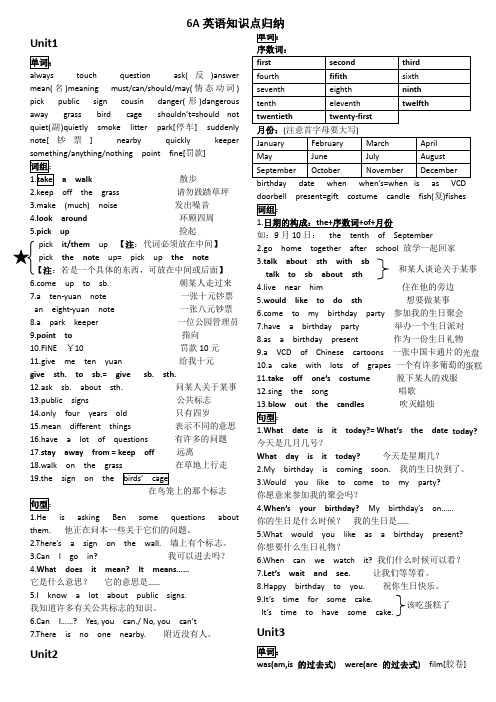
Unit1always touch question ask(反)answer mean(名)meaning must/can/should/may(情态动词) pick public sign cousin danger(形)dangerous away grass bird cage shouldn ’t=should not quiet(副)quietly smoke litter park[停车] suddenly note[钞票] nearby quickly keeper point fine[罚款]a walk 散步2.keep off the grass 请勿践踏草坪3.make (much) noise 发出噪音4.look around 环顾四周5.pick up 捡起pick it/them up 【注:代词必须放在中间】 pick the note up= pick up the note 注:若是一个具体的东西,可放在中间或后面】 e up to sb. 朝某人走过来 7.a ten-yuan note 一张十元钞票 an eight-yuan note 一张八元钞票 8.a park keeper 一位公园管理员 9.point to 指向10.FINE ¥10 罚款10元 11.give me ten yuan 给我十元 give sth. to sb.= give sb. sth.12.ask sb. about sth. 问某人关于某事 13.public signs 公共标志 14.only four years old 只有四岁15.mean different things 表示不同的意思 16.have a lot of questions 有许多的问题 17.stay away from = keep off 远离18.walk on the 在草地上行走 19.the sign on the在鸟笼上的那个标志1.He is asking Ben some questions about them. 他正在问本一些关于它们的问题。
牛津6A语法知识点
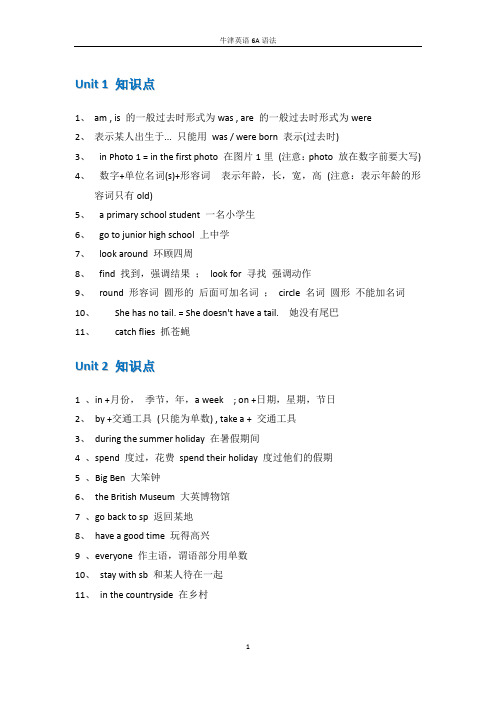
U n i t1知识点1、am , is 的一般过去时形式为was , are 的一般过去时形式为were2、表示某人出生于... 只能用was / were born 表示(过去时)3、in Photo 1 = in the first photo 在图片1里(注意:photo 放在数字前要大写)4、数字+单位名词(s)+形容词表示年龄,长,宽,高(注意:表示年龄的形容词只有old)5、 a primary school student 一名小学生6、go to junior high school 上中学7、look around 环顾四周8、find 找到,强调结果;look for 寻找强调动作9、round 形容词圆形的后面可加名词;circle 名词圆形不能加名词10、She has no tail. = She doesn't have a tail. 她没有尾巴11、catch flies 抓苍蝇U n i t2知识点1 、in +月份,季节,年,a week ; on +日期,星期,节日2、by +交通工具(只能为单数) , take a + 交通工具3、during the summer holiday 在暑假期间4 、spend 度过,花费spend their holiday 度过他们的假期5 、Big Ben 大笨钟6、the British Museum 大英博物馆7 、go back to sp 返回某地8、have a good time 玩得高兴9 、everyone 作主语,谓语部分用单数10、stay with sb 和某人待在一起11、in the countryside 在乡村U n i t3知识点1、for +breakfast / lunch / dinner (三餐前介词用for) 三餐的总称为meal2、What did you have for breakfast? 你早餐吃什么?3、health (名词:健康的意思) healthy (形容词:健康的) unhealthy (形容词:不健康的)That's not healthy. = That's unhealthy. 那是不健康的4、be important to ... 对...重要5、 a little 有一点、little 几乎没有(后面修饰不可数名词)a few 有一点,few 几乎没有(后面修饰可数名词的复数形式)6、should 应该(后面加动词原形)7、修饰可数名词复数和不可数名词的有:a lot of , lots of , plenty of , some , any , no , enough修饰不可数名词的有: much , a little , little修饰可数名词复数的有:many , a few , few8、not ... very often 不经常9、good eating habits 好的饮食习惯poor eating habits 不好的饮食习惯10、eat - ate 6 drink -drank11、and 连词“和”用于肯定句和一般疑问句or 连词“和”用于否定句,用于疑问句时表示选择U n i t4知识点1 、stop - stoppedstop to do sth 停下来去做另一件事,stop doing sth 停止做某事2、say -said3 、one of + 复数名词或复数人称代词宾格,作主语时,谓语部分用单数。
牛津小学英语6A词组和重点语法知识
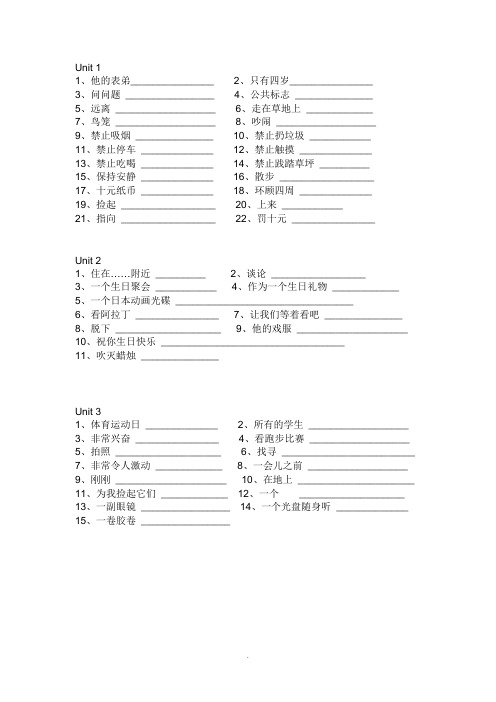
1、他的表弟_______________2、只有四岁_______________3、问问题________________4、公共标志______________5、远离__________________6、走在草地上____________7、鸟笼__________________ 8、吵闹__________________9、禁止吸烟______________ 10、禁止扔垃圾___________11、禁止停车_____________ 12、禁止触摸_____________13、禁止吃喝_____________ 14、禁止践踏草坪_________15、保持安静_____________ 16、散步_________________17、十元纸币_____________ 18、环顾四周_____________19、捡起_________________ 20、上来___________21、指向_________________ 22、罚十元_______________Unit 21、住在……附近_________2、谈论_________________3、一个生日聚会___________4、作为一个生日礼物____________5、一个日本动画光碟________________________________6、看阿拉丁_______________7、让我们等着看吧______________8、脱下___________________9、他的戏服____________________10、祝你生日快乐_________________________________11、吹灭蜡烛______________Unit 31、体育运动日_____________2、所有的学生__________________3、非常兴奋_______________4、看跑步比赛__________________5、拍照___________________6、找寻________________________7、非常令人激动____________8、一会儿之前__________________9、刚刚____________________ 10、在地上_____________________ 11、为我捡起它们____________ 12、一个___________________ 13、一副眼镜________________ 14、一个光盘随身听_____________ 15、一卷胶卷________________1、国庆假日________________2、上个星期___________________3、在节后__________________4、课前_______________________5、看电影__________________6、和我父母一起_______________7、一个有趣的动画__________8、参观一个农场_______________9、跟我的家人一起___________ 10、果树______________________ 11、烧饭_____________________ 12、捡鸡蛋____________________ 13、给奶牛挤奶_______________ 14、摘桔子____________________ 15、给花浇水_________________ 16、尝桔子____________________ 17、拔胡萝卜_________________ 18、在一个野营地______________ 19、打排球___________________ 20、在山脉中穿行______________ 21、非常累___________________ 23、去野营___________________Unit 61、变得非常兴奋______________2、在……之后到来_______________3、参加聚会__________________4、去年_________________________5、一顿丰富的午餐_____________6、拜访他们的亲朋好友____________7、美味的食物_________________8、当然__________________________9、我最喜欢的节日_____________ 10、在十月_______________________ 11、用戏服装扮________________ 12、吃月饼_______________________ 13、玩灯笼____________________ 14、看月亮_____________________ 15、度过时光__________________ 16、一个长假____________________ 17、去沙滩____________________ 18、吃粽子____________________Unit 71、在圣诞节__________________2、在圣诞节那天_________________3、祖父母的房子______________4、圣诞树_______________________5、一个漂亮的皮夹子___________6、喝茶_________________________7、不用谢;别客气_____________8、一些茶_______________________9、我得到了____________________ 10、来自我的爷爷________________ 11、在公交车的后部____________ 12、下车________________________ 13、在……前面________________ 14、走向司机____________________ 15、警察局____________________6A 复习材料〔Grammar)1.人称代词主格:I we you she he it they宾格:me us you her him it them 形容词性物主代词:my our your her his its their名词性物主代词:mine ours yours hers his its theirs2.可数词的复数形式1〕+ s a book ------books2〕- y+ ies a story------stories3〕+ es a glass------glasses a watch------watches4〕+s / +es a piano------pianos a mango-----mangoes5 - f / fe +ves a knife ------knives a shelf--------shelves3. 不可数名词(单复数形式不变) bread, rice, water ,juice , food etc.4. 缩略形式I’m = I amyou’re = you areshe’s = she ishe’s = he isit’s = it iswho’s =who iscan’t =can notisn’t=is notI'd = I wouldI've = I have etc.5. a/ana book a peach an egg an hour an oval an arangean apple6. 方位介词和时间介词方位介词:on, in ,in front of, between, next to, near, beside, at, behind, at the back of, under时间介词:at six o’clock, at Christmas, at breakfast on Monday on 15th July On National Day in the evening in December in winter7. 基数词和序数词one ------ first(1st)Two----second(2nd)three- third(3rd)twenty- twentieth(20th)*序数词必须加the8. Some /any( 肯定句用some,否认疑问句变any)I have some toys in my bedroom.Do you have any brothers or sisters?Would you like some juice? 除外9. be 动词(1) 基本形式: am/are/is (2) 肯定和否认句I am(not) from London. My eyes are(not) small. My hair is(not) long.3〕一般疑问句:Am I a Chniese? Yes, you are.No, you aren’t.Are they American? Yes, they are.No, they aren’t.Is the cat fat?Yes, it is.No, it isn’t。
牛津英语6A语法总结
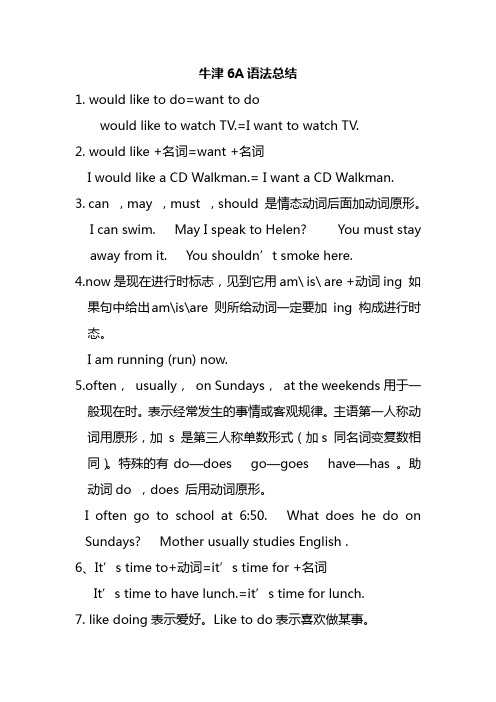
牛津6A语法总结1. would like to do=want to dowould like to watch TV.=I want to watch TV.2. would like +名词=want +名词I would like a CD Walkman.= I want a CD Walkman.3. can ,may ,must ,should 是情态动词后面加动词原形。
I can swim. May I speak to Helen? You must stay awayfrom it. You shouldn’t smoke here.4.now是现在进行时标志,见到它用am\ is\ are +动词ing 如果句中给出am\is\are 则所给动词一定要加 ing 构成进行时态。
I am running (run) now.5.often, usually, on Sundays, at the weekends用于一般现在时。
表示经常发生的事情或客观规律。
主语第一人称动词用原形,加 s 是第三人称单数形式(加s 同名词变复数相同)。
特殊的有do—does go—goes have—has 。
助动词do ,does 后用动词原形。
I often go to school at 6:50.What does he do on Sundays? Mother usually studies English .6、It’s time to+动词=it’s time for +名词It’s time to have lunch.=it’s time for lunch.7. like doing表示爱好。
Like to do表示喜欢做某事。
I like swimming. I like to go with you.8.What date is it today? = what ‘s the date today? 几月几日,回答不能用on. It’s the 24th of January.9. What day is it today?= What’s the day today?问星期几?回答用一周的七天。
上海版牛津英语6A知识点整理
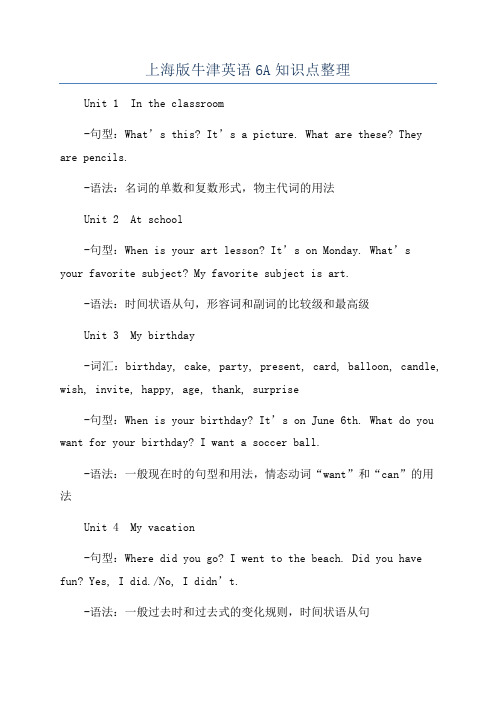
上海版牛津英语6A知识点整理Unit 1 In the classroom-句型:What’s this? It’s a picture. What are these? They are pencils.-语法:名词的单数和复数形式,物主代词的用法Unit 2 At school-句型:When is your art lesson? It’s on Monday. What’syour favorite subject? My favorite subject is art.-语法:时间状语从句,形容词和副词的比较级和最高级Unit 3 My birthday-词汇:birthday, cake, party, present, card, balloon, candle, wish, invite, happy, age, thank, surprise-句型:When is your birthday? It’s on June 6th. What do you want for your birthday? I want a soccer ball.-语法:一般现在时的句型和用法,情态动词“want”和“can”的用法Unit 4 My vacation-句型:Where did you go? I went to the beach. Did you have fun? Yes, I did./No, I didn’t.-语法:一般过去时和过去式的变化规则,时间状语从句Unit 5 Animals and plants-词汇:animal, plant, kangaroo, elephant, lion, tiger, monkey, panda, parrot, snake, butterfly, grass, flower, tree, forest-句型:What can parrots do? They can fly and talk. What are pandas’ favorite food? Their favorite food is bamboo.-语法:情态动词“can”的用法,描述事物的特征和能力Unit 6 In the garden-词汇:garden, vegetable, tomato, carrot, radish, onion, potato, cucumber, cabbage, turnip-句型:What can you see in the garden? I can see tomatoes, carrots, and onions. What’s your favorite vegetable? My favorite vegetable is cucumber.-语法:复数形式的可数名词Unit 7 We’re going to the zoo-词汇:zoo, lion, panda, monkey, kangaroo, tiger, bear, elephant, snake, ostrich, tortoise-句型:What are you going to do? We’re going to the zoo. Can snakes fly? No, they can’t.-语法:be going to表示将来的句型和用法,否定词can’t的用法Unit 8 On the farm-词汇:farm, pig, horse, sheep, chicken, cow, duck, dog, cat, lamb, chick, puppy, kitten-句型:How many pigs are there? There are three pigs.What’s your favorite farm animal? My favorite farm animal is a horse.-语法:数词和名词的复数形式Unit 9 At the supermarket-词汇:supermarket, mall, shop, store, grocery, bread, egg, cheese, juice, milk, butter, tea, coffee, sugar, salt-句型:What do you want to buy? I want to buy some bread. How much is the milk? It’s twenty yuan.-语法:不可数名词的用法,询问物品价格的句型和用法Unit 10 Clothes-词汇:clothes, hat, shirt, T-shirt, dress, skirt, pants, shorts, socks, shoes, coat, gloves, watch, scarf-句型:What are you wearing? I am wearing a hat, a T-shirt, and shorts. How much are the shoes? They are fifty yuan.-语法:指示代词和指示形容词,描述衣物的材料和颜色Unit 11 Our body-词汇:body, head, face, hair, eye, nose, mouth, ear, hand, arm, leg, foot, finger, toe-句型:What can you do with your hands? I can write and draw with my hands. How many fingers do you have? I have ten fingers.-语法:名词所有格的用法,询问数量和回答数量的句型以上是上海版牛津英语6A教材中的部分重要知识点的整理。
新版译林牛津6AU2知识点和考点
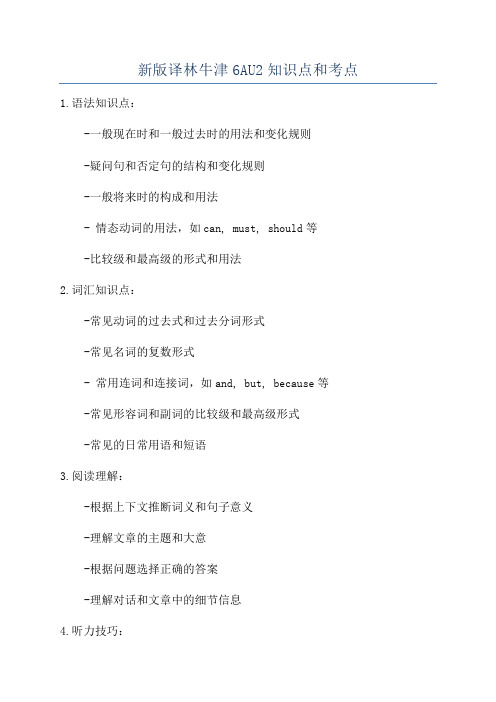
新版译林牛津6AU2知识点和考点1.语法知识点:-一般现在时和一般过去时的用法和变化规则-疑问句和否定句的结构和变化规则-一般将来时的构成和用法- 情态动词的用法,如can, must, should等-比较级和最高级的形式和用法2.词汇知识点:-常见动词的过去式和过去分词形式-常见名词的复数形式- 常用连词和连接词,如and, but, because等-常见形容词和副词的比较级和最高级形式-常见的日常用语和短语3.阅读理解:-根据上下文推断词义和句子意义-理解文章的主题和大意-根据问题选择正确的答案-理解对话和文章中的细节信息4.听力技巧:-听懂并理解对话和文章的大意-倾听并记录关键信息和细节-根据听到的内容选择正确的答案-辨认不同音调、语气和语速的说话者-掌握一些常见的听力策略和技巧5.口语表达:-使用正确的句型和词汇进行口语表达-学会用简单的句子描述事物、表达意见和情感-学会询问问题和进行交流-掌握一些常见的口语交际用语和口头表达方式6.写作技巧:-使用正确的语法和词汇进行书面表达-学会写简单的句子和段落描述事物和经历-学会写简单的信件和日记-学会根据指导写作要求进行写作-逐渐提高写作的准确性和连贯性7.文化背景:-介绍一些英语国家的文化和风俗-学习一些英语国家的地理和历史知识-了解一些与英语语言和文化相关的名人和事件-通过阅读理解等学习材料了解不同文化之间的差异和相似之处以上只是可能的知识点和考点总结,实际教材可能还有其他内容。
学生在学习时,应该根据教材的具体要求和教师的指导进行有针对性的学习和复习。
牛津小学英语6A复习提纲
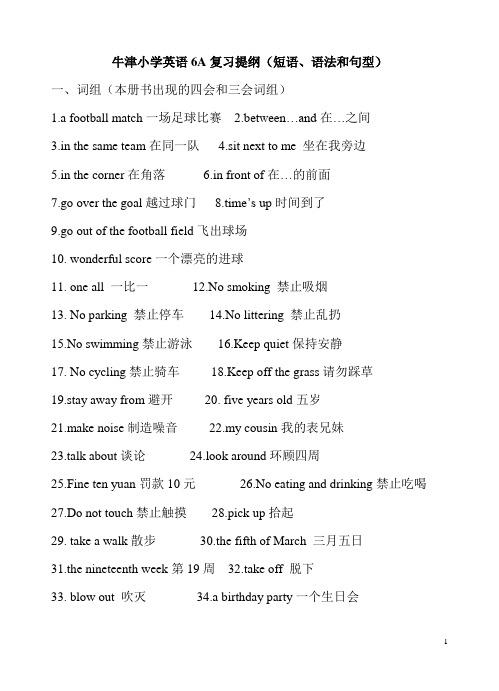
牛津小学英语6A复习提纲(短语、语法和句型)一、词组(本册书出现的四会和三会词组)1.a football match一场足球比赛2.between…and在…之间3.in the same team在同一队4.sit next to me 坐在我旁边5.in the corner在角落6.in front of在…的前面7.go over the goal越过球门8.time’s up时间到了9.go out of the football field飞出球场10. wonderful score一个漂亮的进球11. one all 一比一 12.No smoking 禁止吸烟13. No parking 禁止停车 14.No littering 禁止乱扔15.No swimming禁止游泳16.Keep quiet保持安静17. No cycling禁止骑车18.Keep off the grass请勿踩草19.stay away from避开 20. five years old五岁21.make noise制造噪音22.my cousin我的表兄妹23.talk about谈论 24.look around环顾四周25.Fine ten yuan罚款10元26.No eating and drinking禁止吃喝27.Do not touch禁止触摸 28.pick up拾起29. take a walk散步30.the fifth of March 三月五日31.the nineteenth week第19周 32.take off 脱下33. blow out 吹灭34.a birthday party一个生日会35.a VCD of Chinese cartoons 一盘中国卡通片的VCD36.as a birthday present作为一份生日礼物37.a piece of paper一张纸 38.fold it in half对折39.a running race一场跑步比赛40.just now 刚才41.a moment ago刚才 42.a roll of film一卷胶卷43.a pair of glasses一副眼镜 44. in July在七月45. Sports Day体育活动日46. watch the moon赏月47. a pair of earphones一副耳机 48. last week上星期49. plant trees种树50. pull up carrots拔胡萝卜51. pick up oranges摘橘子52. on the farm在农场53. an exciting film 一部令人激动的影片54. in the mountains在山里55. a science festival 科技节56. a food festival美食节 57. a kite festival 风筝节58. National Day 国庆节59. have a chat聊天60. have a good time 过得愉快61. at the weekends 在周末62. after dinner晚饭后 63. a lot of colourful kites许多色彩艳丽的风筝64. Children’s Day儿童节65.New Year’s Day新年66. their relatives 他们的亲戚 67. something to drink一些喝的东西68. dress up装扮69. favourite food最爱的食物70. dragon boat race龙舟赛 71. last year去年72. Mid-Autumn Festival中秋节73.Dragon Boat Festival端午节74. Spring Festival春节 75. eat rice dumplings吃粽子76.make pumpkin lanterns 做南瓜灯77.police station 警察局78.this morning 今天早晨 79. get off 下车80. point to 指向81. at the back of 在后部82. the present from his friend 朋友送的礼物二、语法知识1、序数词序数词的构成是在以之相对应的基数词词尾加th,个别例外:◆one – first two—second three—thirdfive—fifth eight—eighth nine—ninthtwelve – twelfth◆以ty结尾的,先变y为i,加thforty—fortieth◆缩写形式1st 2nd3rd 4th 5th 22nd 31st2、规则动词的过去时词尾变化◆一般情况下加ed◆以不发音的e结尾的加d◆以辅音字母+y结尾的变y为i,加ed。
牛津小学英语6A各单元 知识梳理
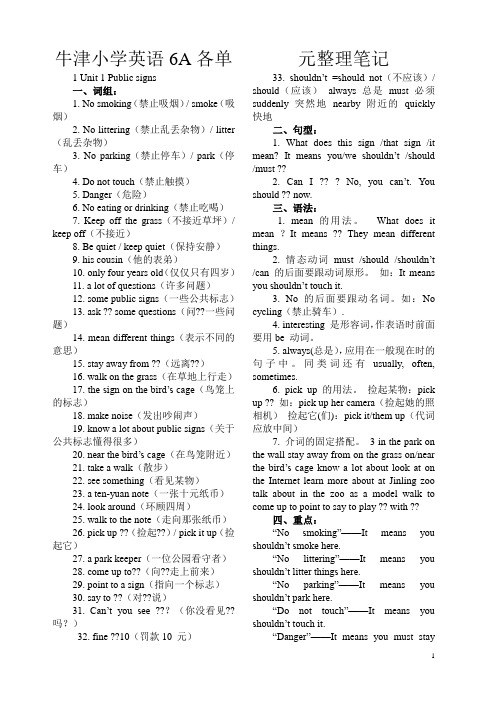
牛津小学英语6A各单元整理笔记1 Unit 1 Public signs一、词组:1. No smoking(禁止吸烟)/ smoke(吸烟)2. No littering(禁止乱丢杂物)/ litter (乱丢杂物)3. No parking(禁止停车)/ park(停车)4. Do not touch(禁止触摸)5. Danger(危险)6. No eating or drinking(禁止吃喝)7. Keep off the grass(不接近草坪)/ keep off(不接近)8. Be quiet / keep quiet(保持安静)9. his cousin(他的表弟)10. only four years old(仅仅只有四岁)11. a lot of questions(许多问题)12. some public signs(一些公共标志)13. ask ?? some questions(问??一些问题)14. mean different things(表示不同的意思)15. stay away from ??(远离??)16. walk on the grass(在草地上行走)17. the sign on the bird’s cage(鸟笼上的标志)18. make noise(发出吵闹声)19. know a lot about public signs(关于公共标志懂得很多)20. near the bird’s cage(在鸟笼附近)21. take a walk(散步)22. see something(看见某物)23. a ten-yuan note(一张十元纸币)24. look around(环顾四周)25. walk to the note(走向那张纸币)26. pick up ??(捡起??)/ pick it up(捡起它)27. a park keeper(一位公园看守者)28. come up to??(向??走上前来)29. point to a sign(指向一个标志)30. say to ??(对??说)31. Can’t you see ???(你没看见??吗?)32. fine ??10(罚款10 元)33. shouldn’t =should not(不应该)/ should(应该)always 总是must 必须suddenly 突然地nearby 附近的quickly 快地二、句型:1. What does this sign /that sign /it mean? It means you/we shouldn’t /should /must ??2. Can I ?? ? No, you can’t. You should ?? now.三、语法:1. mean 的用法。
牛津英语6a知识点梳理

牛津教材6A知识点大盘点(上)Prepositions:◆at1) 用于表示位置或地点She works at the hospital.I am at home all the morning.2) 用于表示时间I usually get up at 7 o’clock.What are you going to do at the weekend?3) 意为“面向;朝着;对着”What are you looking at?She shouted at me, but I couldn’t hear that.4) 固定结构be good / poor at 擅长于/ 不善于at night 在晚上at noon 在正午at work 在工作◆on1) 意为“在……上”(有接触面)Leave the glasses on the table.He was sitting on the grass.2) 表示在某地或某位置I live on the other side of the road.3) 表示方向The girl on the right / left is my sister.On my way to school, I bought a pen.4) 与表示具体日期的词语连用We’ll have a party on the evening of May 1st. They have a computer class on Monday. 5)表示穿着、带着Put on your new coat / shoes / hat.I’ve got no money on me.6) 意为“有关;关于”a talk / an article on history 关于历史方面的一次讲座/ 一篇文章7)固定结构on foot 步行on the phone 在听电话be on 上演on holiday 在度假get on 上车◆in1) 表示在某范围内She lives in a small village in France.There is a book in the box.2) 表示在某段时间内It happened in the past.My birthday is in August.3) 表示在某段时间后She will visit there in three weeks.I’ll come back in ten minutes.4) 固定结构be in = be at home 在家in spring / summer / autumn / winter 在春天/ 夏天/ 秋天/ 冬天in time 及时in hospital (生病)住院◆above 在……上方(没有接触面)The people in the flat above mine made a lot of noise.◆below 在……下方(没有接触面)Please do not write below this line.The temperature fell below freezing during the night.Adverbs:◆副词的分类1) 频度副词: always, often, usually, sometimes, seldom, hardly, never2) 地点副词: here, there, everywhere, anywhere, inside, outside3) 程度副词: much, little, very, rather, so, too, still, quite, enough, almost, slightly4) 疑问副词: how, when, where, why5) 表示先后顺序的副词:first / next / then / after that / finally; firstly / secondly / next / then / after that / finally◆副词的位置1) 多数副词都可以放在动词的后面;但如果动词带有宾语,副词就需放在宾语后面。
牛津小学英语6A主要语法知识及单词词组句式

牛津小学英语6A主要语法知识一般过去时:定义:表示过去某个时间发生的动作或存在的状态,常与表示过去的时间状语连用。
如:yesterday,last night ,three months ago,just now,a moment ago,that night 等。
它的肯定形式:I was born in 1995. I watched cartoons last night.它的否定形式:Were you born in 1995? Yes , I was./No, I wasn’t一般疑问形式及肯(否)定回答:Did you watched cartoons last night? Yes, I did./ No ,I didn’t.特殊疑问形式:When were you born? What did you do last night?动词的过去式形式:a:规则动词的过去式词尾变化:1. 一般情况下加ed,如watered,planted2. 以不发音字母e结尾的加d,如:tasted。
liked,lived3. 以辅音字母+y结尾的变y为i,再加ed,study——studied4. 单音节,以一个元音字母和一个结尾的,双写这个辅音,再加ed,如:stop-stoppedb:规则动词的词尾读音:a) 在浊辅音和元音后读/d/,如:pulled ,wateredb) 在清辅音后读/t/,如cooked , milked ,asked , picked, walkedc) 在/t/和/d/音后读/id/,如:collected , tasted , pointed , studiedc:不规则动词的变化没有什么规律,需要大家背熟记牢:is/am–was are-were do-did have/has-had go-went make-made sit-sat get-got see-saw come-came swim-swam put-put eat-ate drink-drank fly-flew buy-bought run-ran drive-drove know-knew meet-met catch-caught ride-rode sing-sang speak-spoke say-said teach-taught take-took think-thought write-wrote give-gave begin-began tell-told hear-heard keep-kept draw-drew 代词分为两种:人称代词和物主代词。
牛津小学英语6A知识点整理

Unit 1 一词组和日常用语No smoking 禁止吸烟No littering 禁止乱扔杂物No parking 禁止停车Do not touch 禁止触摸Danger!危险No eating or drinking 禁止吃喝keep off the grass 禁止践踏草坪Be quiet 保持安静keep quiet保持安静his cousin 他的表弟on the wall在墙上go in入内a lot of questions许多问题ask sb. some questions about sth.问某人一些有关某事的问题only four years old仅仅四岁a lot of public signs许多公共标志mean different things意味着不同的意思walk on the grass在草地上走make noise发出喧闹的声音know a lot about public signs知道许多有关公共标志的知识the sign on the birds’ cage在鸟笼上的标志climb the tree爬树stay away from the building远离那座建筑物at home在家give me ten yuan给我十元take a walk 散步take photos拍照see something on the grass看见草地上有些东西a ten yuan note一张十元纸币look around看看四周walk to the note走向纸币pick it up 拣起它pick up your pencil拣起你的铅笔come up to him来到他面前a park keeper一个公园管理员point to a sign on the grass指着草地上的一个标志the boy in the green sweater穿着绿色毛衣的男孩shake one’s head摇头on the Internet在网上二.句子1. What does this sign mean? It means ‘No smoking’.It means you shouldn’t smoke.这个标志什么意思?它意味着“禁止吸烟”。
- 1、下载文档前请自行甄别文档内容的完整性,平台不提供额外的编辑、内容补充、找答案等附加服务。
- 2、"仅部分预览"的文档,不可在线预览部分如存在完整性等问题,可反馈申请退款(可完整预览的文档不适用该条件!)。
- 3、如文档侵犯您的权益,请联系客服反馈,我们会尽快为您处理(人工客服工作时间:9:00-18:30)。
How about what about
问情况/怎么样
更多资料请联系 Ms Zhang:181 2131 6851 (开通微信)
—How do you go to school? —By bus.
—How many books are there? —There are five. —How many times have you been there? How many uncles do you have? —How much is it? —Twenty yuan. —How old are you? —I’m twelve. —How far is it from here? —It’s about one kilometer. —How often do you go to visit your relatives? —Once a month.
must 必 须 / mustn’t 不允许
一定
needn’t 不需要
can’t 不可能
表猜测(确定); 表义务
book? 1 _x0001_ 当 must 意 为 必 须
时 , 其 否 定 通 常 为 needn’t 不需要; 2 _x0001_ 当 must 意 为 一 定 时,其否定形式通常为 can’t 不可能。 3 _x0001_ mustn’t 通 常 单 独 使用,表示对某种行为的禁 止,常见于法律条文、规章 制度中。
—How fast can you run? 你能跑多快? —I can run a mile in nine minutes. 我九分钟可以跑 一英里。 —I’m thirsty. How about you? —Me, too.
3)、其他类
when which where who whose Whom why
—How soon will you come back home? —In a week. —How long have you been here? —For about three years.
Since 2010 Since three years ago. Since I graduated.
should 应该 shouldn’t 不应该 表义务
I have a rest? 语气弱于 must,通过是表达自己 的观点,认为对方应该做什么。
need 需要 needn’t 不需要
表需求
need 除了是情态动词外,还能作 为实义动词,意义不变,但用法 不一样。need to do sth.
牛津版 6A 语法点概括
什么时候 哪一个 哪里 谁 谁的 谁(宾格) 为什么
Байду номын сангаас
—When is your birthday? —It’s on the first of May. —Which is your watch, this one or that one? —That one. —Where is my pen? —It’s on the floor. —Who is the boy with big eyes? —He’s Liu Tao. —Whose bag is this? —It’s Helen’s. Whom —Why are you absent today? —I’m ill.
常用情态动词归纳
肯定形式
否定形式
含义
注意事项
can 能够 may 可能
can’t 不能够,不可 能
may not 可能不
表能力或对件事情 发生的可能性的否 定 表猜测(不确定)
对于 can’t 表不可能的用法要留 意,如:He can’t be at home now
because he went to Beijing. 在一般疑问句中,can 与 may 通 常能与 I 连用来征求对方意见, 如:Can/May I have a look at your
none
没有人或物 这里表示
either other(s) another
每个 另一个(些)
这里表示 这里表示
另一个,又一个 这里表示
这里表
仅指两个人或物
这里表
这里表 这里表
指两个以上的人或物,当指可数名词时, 谓语动词用单、复数都可以。
强调个性,指两个或两个以上的人或物。 _______
这里表
相当于 an other
What else do you do with your aunt?
牛津版 6A 语法点概括
更多资料请联系 Ms Zhang:181 2131 6851 (开通微信)
牛津版 6A 语法点概括
2)、how 以及 how 短语
How
怎样 问方式
对副词、by+doing/n. 等 提
问
How many
修饰可数或不可数名词,复合形式只具有
nobody 无人 no one 无一人
名词的作用
everything 每一个事物,一切 everyone 每人=everybody
这里表示
这里表
强调共性,词义和 all 相近
代替或修饰可数名词时,指两个以上的人 或物,也可代替或修饰不可数名词。
这里表示
这里表 强调个性,指两个或两个以上的人或物。
on 通常用于:
确定某天的某段时间:on the evening of 3rd, Dec. ,on Sunday afternoon
星期:on monday
确切日期: on May 1st
节日当天:on New Years Day, on Teachers’ Day
有修饰部分的早中晚:on a fine morning;on Sunday afternoon;
这里表示
这里表
表示否定
一些,几个(可) 这里表示
这里表
表示否定
很少(不可数) 这里表示 一些(不可数) 这里表示 很多(可数) 这里表示 很多(不可数) 这里表示
这里表 这里表 这里表 这里表
表示否定 表示否定 _______ _______
两个,两者都 这里表示
这里表
仅指两个人或物
neither
没有人或物 这里表示
牛津版 6A 语法点概括
更多资料请联系 Ms Zhang:181 2131 6851 (开通微信)
语法点索引
1、疑问词
以 what, where, when, hoe old, how many 等开头的特殊疑问句的用法; answers1 能熟练地应对 how, what, why 等特殊疑问句,并发挥想象力,表达自己的感想 6
would 愿意 wouldn’t 不愿意
表示意愿
常用语 would like to do sth 的句 型中,表征求对方意见。如,
shall
shall not
征求对方意见
Would you like to have a coffee? 常与在一般疑问句中与 I 搭配使 用,表示征求对方意见。如,Shall
1)、what 以及 what 短语
what
什么
What colour
什么颜色
What day
星期几
What date
几月几日
What shape
什么形状
What time
几点钟
What kind of
问种类
What…job
什么工作
(问工作)
What…for
为了什么
How about what about What else
问情况/怎么 样 其他什么
—What’s your name? —My name is Tom. —What colour is your coat? —It’s red. —What day is it today? —It’s Monday. —What date is it today? —It’s the first of June. —What shape is the moon? —It’s round. —What time is it? —It’s ten o’clock. —what kind of food did you have in the morning? —What’s your father’s job? —He’s a bus driver. —what job does your father do? — what does your father do? — what’s your father? — what do you do this for? — To succeed = why do you do this? —I’m thirsty. How about you? —Me, too.
one
一个(人或物) 这里表示
这里表
one 的复数形式是 ones
5、 介词
1.表示时间的介词 1)掌握 at, in ,on 作介词表时间时的用法 2
at 通常用于: 确切地时间:at 3:20 用餐时间:at lunchtime 表示在一段节日期间: at Christmas 固定词组搭配: at night, at midnight, at noon, at dawn, at this time, at this moment,
注意:在 last, next, this, that, some, every 等词之前一律不用介词。如:We meet every day.
时间名词前介词用法口诀
年前周前要用 in 具体日子要用 on 遇到几号也用 on 上午下午得是 in 要说某日上下午 用 on 换 in 记清楚 午夜黄昏用 at 黎明用它也不错 at 用在时分前 说“差”可要用上 to 说"过''要用 past
